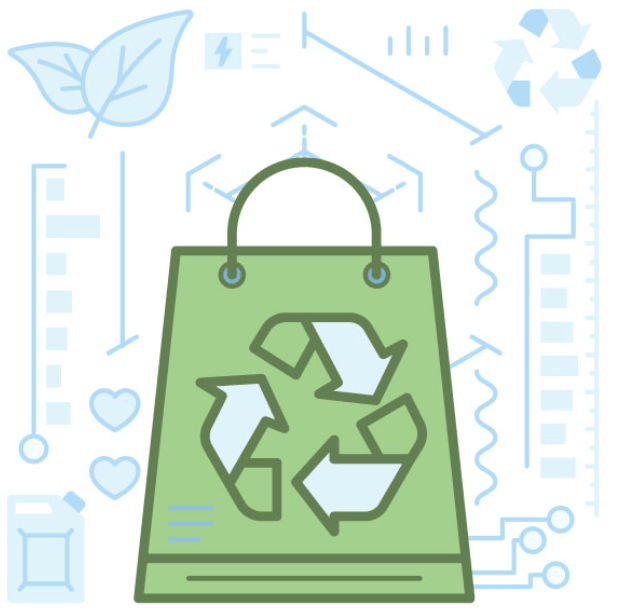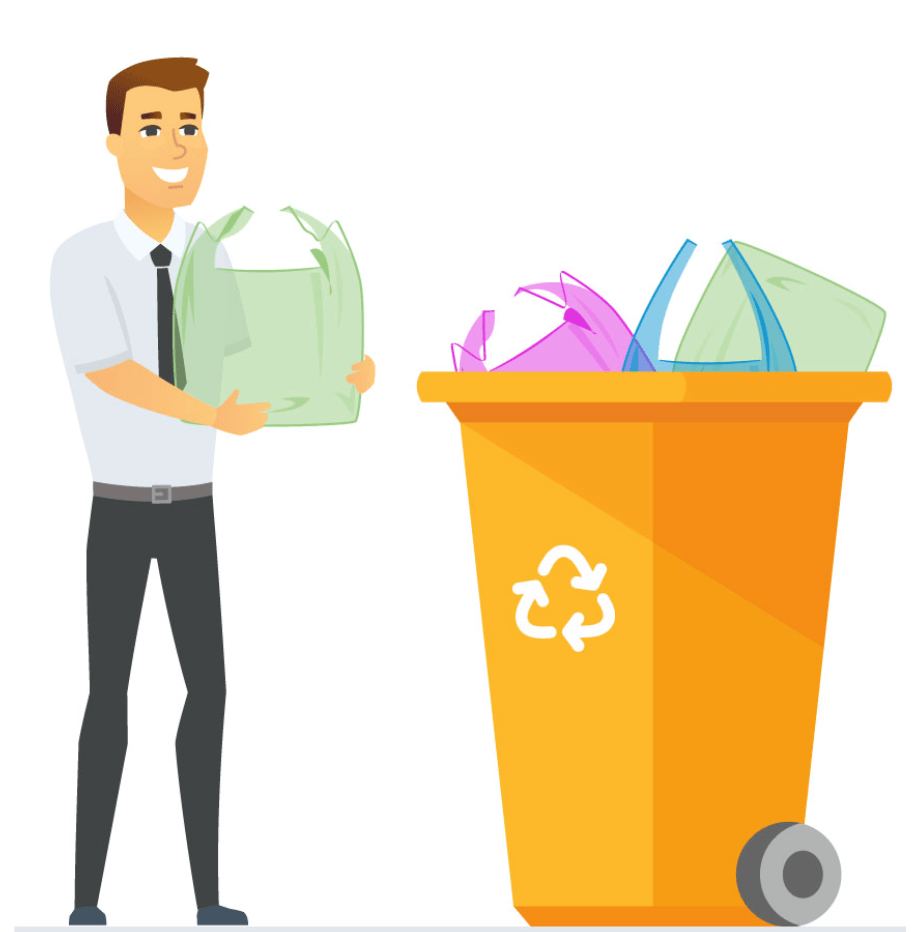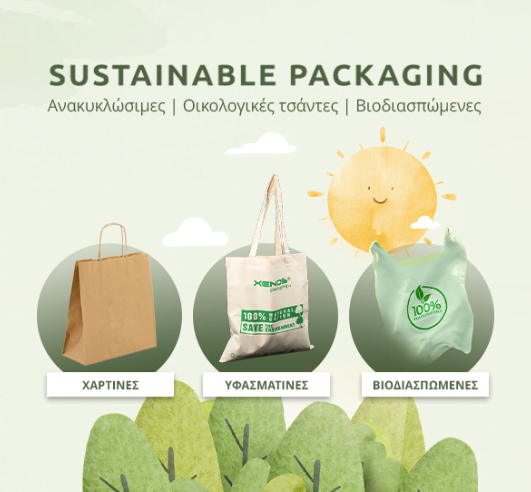I am text block. Click edit button to change this text. Lorem ipsum dolor sit amet, consectetur adipiscing elit. Ut elit tellus, luctus nec ullamcorper mattis, pulvinar dapibus leo.
Over time since the first implementation of the environmental levy on plastic bags, we can now say that a lot has changed.
Environmental tax to plastic bags in Greece
What was in force until now…
In 2018, the government imposed an extra charge on the plastic bag operator on thin plastic bags (15-50mm) of €0.03/bag, which with the addition of VAT amounted to €0.04/bag. The aim of this measure was to reduce them for environmental reasons. The following year this fee was set at €0.07/bag and, with VAT, rose to €0.09/bag in order to further reduce the use of plastic bags.
This, however, resulted in many operators preferring bags with a greater wall thickness of 50-70μm, which did not charge them a fee but did not serve the real purpose of the fee, which is recycling.
According to a study by EOAN (National Recycling Organization), in 2018-2019, there was a 26% reduction in the production and handling of the thin plastic carrier bag, but a large increase in the production and handling of the thicker and theoretically “reusable” bag, by 93%. Furthermore, there was an increase in the production and handling of very thin plastic carrier bags (<15 μm), by 30%, for which no surcharge was applied as they would be ‘single-use’ bags.
In addition to the above tax that was imposed on the businessman who purchased plastic bags, the plastic bag producer was obliged from the first implementation of the law until today, to pay to EOAN 0.066 € / kg where with VAT amounted to 0.08 € per plastic bag produced, regardless of its thickness.

… From 1 January 2021
…the environmental fee ceased to exist only for a specific thickness and the bag charge applied is now uniform, at a price of €0.0705 where with VAT it was set at €0.093/bag.
The aim of this measure was none other than to drastically reduce the use of plastic bags by Greek consumers and switch to alternative materials.
From July 2021, the extended responsibility of the bag producer towards the EOAN was defined, which producer has now the obligation for each plastic bag produced to pay 0.0705€ plus VAT i.e. 0.093€/pound of plastic bag AND in addition to be charged with the piece levy of 0.0004€/piece only for plastic packaging that are not transport bags but are used at filling points. Such bags are: couriers and packaging in ovens, etc.
So, for every plastic bag, regardless of thickness or use, the producer is obliged to pay this extra enviromental tax, which he pays annually to the Greek recycling organisation. All plastic bags that are exported are excluded.
As far as the obligation of the entrepreneur is concerned, the financial burden of 0.07€/kg plus VAT remains, i.e. 0.09€. This tax is the so-called environmental fee, is paid annually to the state and is passed on to the final consumer of the product via the receipt. Of course, many businessmen, although this tax is shown on the receipt, do not demand it from the customer, wanting in this way to show their social sensitivity.
Environmental tax on paper bags in Greece
Furthermore, from July 2021, the extended responsibility of the producer of paper bags towards the EOAN was defined: i.e. the producer is now obliged to pay €0.0004/plot and €0.0555/kg environmental tax for each paper bag produced.
On the other hand, the shopkeeper has no additional tax obligation.
The solution is called “advanced recycling”!
Plastic stands out as a material for its high strength and flexibility and its wide use is inevitable. The spread of ecological awareness and consumer consciousness has led to reactions to the destructive effects of plastic, resulting in the evolution of the recycling process. Today a plastic bag can be fully recycled, thus achieving the circular economy as we will see below.

Let’s see in practice what steps need to be taken by manufacturers, entrepreneurs and consumers so that plastic bags not only do not pose an environmental problem but also lead to the goal of a circular economy.
The plastic bag manufacturing company
It all starts with the obligations that the packaging company has to meet.
Plastic bag producers are required to register in the National Register of Producers maintained by EOAN, certifying their legality. The unique Producer Registration Number they receive, which they are required to display on the bag, certifies the legality of the process. They are also required to pay the recycling fee per kilogram of bag sold.
The businessman who supplies a plastic bag
The businessman in turn informs his own customers about the importance of throwing the plastic bag they have just picked up from his shop in the special recycling bins and not in the common rubbish bins.
The consumer

The consumer must throw the plastic bag in the plastic recycling bins. The plastic bag will be taken for recycling, which, according to the new advanced processing procedures, will be transformed into plastic granules. This granulate will be sold again as raw material to companies producing plastic products.
When these manufactured products have reached the end of their useful life, if properly recycled, they will be returned to their original form, transformed into plastic granules and sold again to the same plants.
So in this process, each plastic package is recycled, with the aim of reusing it – turning it into a new plastic product – in a new plastic bag. In fact, this granule will be sold cheaper to the businessman who will then buy it as a bag, at a more affordable price, with a new certificate.
This cyclical process of recycling also leads to the circular economy, which is beneficial for everyone from both an environmental and economic point of view. If the process is followed by everyone, the life cycle of a plastic bag can be perpetual.
Xenos Packaging thinks green

In conclusion, we would like to emphasize that the plastic bag, if all the requirements are met, can become environmentally friendly and at the same time contribute to the country’s circular economy through recycling.
The necessary move is for all of us to embrace the essence of recycling and help create a sustainable and cleaner environment. It is our responsibility to make good use of plastic so that it can be fully integrated into the circular economy and have an “eternal” waste-free life.
We here at Xenos Packaging SA are sensitive and aware of environmental issues. Holding ISO 9001:2015, ISO 45000, ISO 14001 and FSSC 22000, we use the best materials by following all the legal production procedures that we have to, paying the supervised tax for the production of plastic bags.
Our main concern is to raise awareness and inform our entrepreneurs/partners so that the plastic bag can complete its cycle. At the same time, we offer a huge range of environmentally friendly packaging, so that the consumer can choose the right yet eco-friendly packaging solution for their business.
Time to embrace eco-friendly packaging SUSTAINABLE PACKAGING the new everyday life


